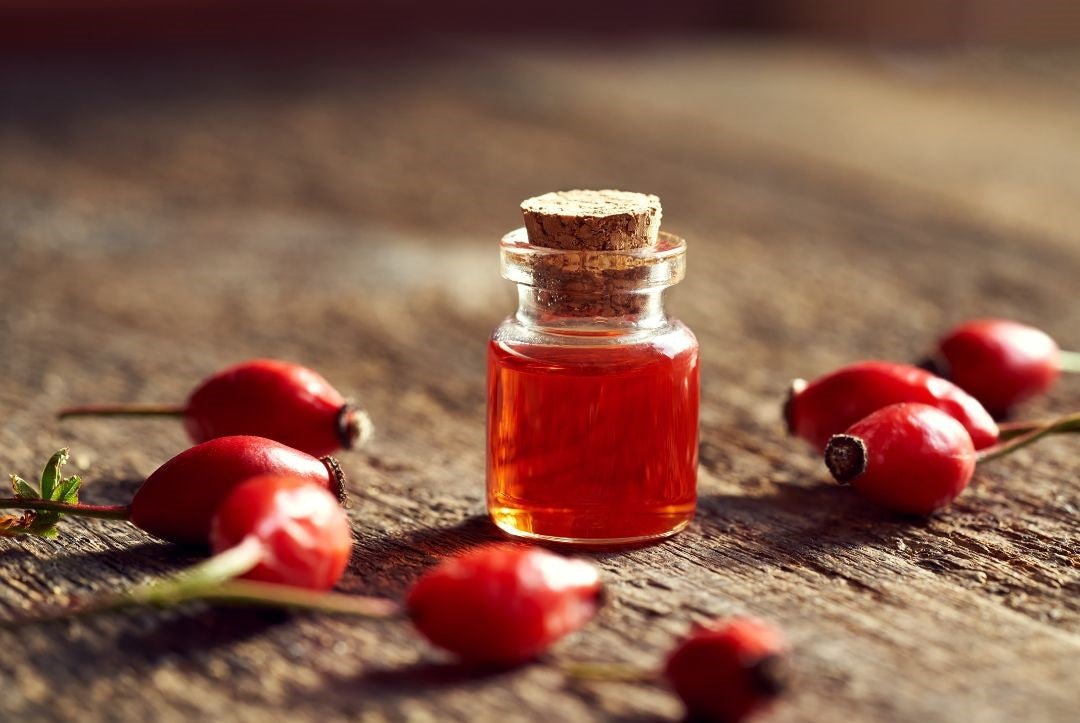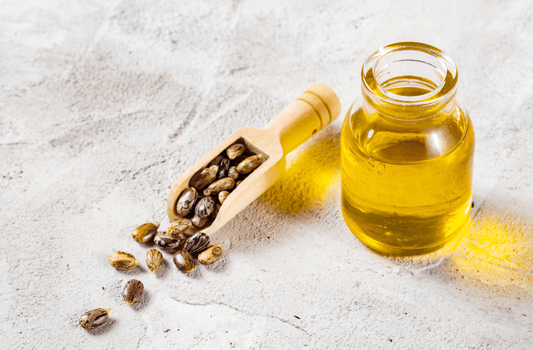Are you a fan of rosehip oil in cosmetics? At The Soapery, we love rosehip oil for its nourishing and rejuvenating properties.
But have you ever wondered about the purity of the rosehip oil you are using?
If a company says it’s pure, then it must be pure right? You may be surprised to know that just because the label says ‘rosehip oil’, doesn’t mean it’s actually rosehip oil.
Don’t believe us? Let’s start from the beginning…
Contents
- What Are You Really Buying?
- What is Rosehip Oil?
- What Are The Different Types of Rosehip Oil?
- Behind the Scenes of the Production Process
- How is Rosehip Oil Adulterated?
- How to Prevent Buying Adulterated Rosehip Oil?
- Conclusion
What Are You Really Buying?
We gathered 7 samples of rosehip oil from different online retailers.
Only 4 of them were pure rosehip oil.
Disappointingly, these results are actually the best we’ve had so far in our purity journey. Yet, 3 of the so-called ‘rosehip oils’ contained less than 10% of actual rosehip!
Let’s look into what rosehip oil really is…

What is Rosehip Oil?
Rosehip seed oil is extracted from the rose hips (seed pods) of wild rose plants. The main producers of rosehip oil are in Bulgaria and Chile.
It's known for its high content of essential fatty acids and for its exceptional moisturising properties. It also has a low comedogenic rating of 1, meaning it won't clog pores and is suitable for all skin types.
What Are The Different Types of Rosehip Oil?
When it comes to rosehip oil, you’ve got these choices:

Refined or unrefined?
Unrefined rosehip oil is a red, orange colour and has not had the scent removed. It keeps all the natural properties and is perfect for a very natural recipe, if you don’t mind the colour.
Refined rosehip oil has had the colour and scent removed to create a more neutral oil. It is ideal for recipes with added scents or colours, as the natural colour won’t affect the result.
Organic or non organic?
Organic rosehip oil has had no synthetic pesticides used on the plants. The Soil Association certify all our organic products. They inspect us annually to make sure we comply with their strict regulations.
Non organic rosehip seed oil has pesticides used in its process. However, this means they are able to make more as the plant is not affected by pests. 
Behind the Scenes of the Production Process
Picture this, you’re buying rose hip seed oil from a producer. They offer you a range of prices and ultimately, you want to get the best deal you can, right?
But in reality, they can only offer low prices because they’ve diluted the rosehip oil in a cheaper oil.
So how much you are willing to spend, will determine how much actual rosehip oil you get.
Crazy right?
And if that’s not enough, producers will label all of these as just ‘rosehip oil’, deceiving wholesalers, retailers, and you, the customers.
Okay, I know what you're thinking. How can we tell which oils are pure and which are fake?
Let’s look into it…
How is Rosehip Oil Adulterated?
Producers will dilute the pure rosehip seed oil in a cheaper oil. The most common oil they use is sunflower oil as they can make it look very similar to the real thing.
So how can we tell? Most of the time, you can use a Certificate of Analysis (COA) to find anomalies in the oils composition.
Let’s break this down…
In technical terms, natural oils are usually described by their fatty acid profile. This tells you what percentage of which fatty acid is in the oil.
There are many types of fatty acids, with names like Oleic Acid, Linoleic Acid etc.
Here’s the fatty acid range you expect to see pure rosehip oil in:

To put it simply, the results on a COA for rosehip oil should fall inside each of these ranges.
From our testing, we spotted one “rosehip oil” that was 97% sunflower oil and 3% rosehip oil. Another was slightly better, at 6% rosehip oil.
Let’s look at the fatty acid profile of the 97% sunflower and 3% rosehip, next to 100% pure rosehip oil:

The results look really similar right?
Now check if these results fit inside the range they should be in for rosehip oil.
The biggest giveaway on this table is the linolenic acid (C18:3). The linolenic acid result for the blend is way below the range it should be in.
Now you know what to look for on COA documents, don't fall for the deceptive blends - your skin deserves better!

How to Prevent Buying Adulterated Rosehip Oil?
Checking COA’s isn’t always reliable, some adulterated oils will still go under the radar.
The only way to guarantee the purity of rose hip oil is with third-party lab testing.
Unfortunately, this process can be costly, time-consuming and requires a level of understanding to know what to test for.
Because of this, not everyone will be willing to go through this process. But it is the only way to verify you are using 100% pure rosehip seed oil.
What steps can you take to reduce your chances of receiving an adulterated oil?
Here’s a checklist:
- Is the oil unrefined or refined? In our experience, most of the adulteration takes place with refined rosehip oil. Presumably because it is easier to mix with another oil and not change the appearance.
- Has your supplier done their own analysis of the oil? If they are relying on supplier documentation it means they have no idea what is in the oil.
- Do they actually know who made the rosehip oil? If there’s no traceability, there’s no honesty.
- Do the specifications given match the specifications that we gave above? We’ve seen many, many specifications that don’t. They are all designed to make sure that adulterated rosehip oil passes off as genuine.
- Is the alpha-linolenic acid of their rosehip oil above 20%? If it isn’t, it isn’t pure rosehip oil.
- Can they answer these questions? What are their sourcing practices, extraction methods and quality control measures? If they can’t be honest, then how can you be sure they are a trustworthy supplier.
At the end of the day, it’s not just about avoiding being ripped off, it’s also protecting your health.
Our tests uncovered the use of sunflower oil in ‘rosehip oil’, but it could be any oil. These cheap oils could cause skin irritation or allergic reactions on sensitive skin.
It’s not worth the risk!

Conclusion
In a nutshell, it’s fraud!
You are paying rosehip oil prices and receiving sunflower oil with a little bit of rosehip. It’s unacceptable.
You deserve to get exactly what you paid for and experience the moisturising wonders of 100% pure rosehip oil!
Our promise: We will only sell 100% pure rosehip oil. We test our rosehip oil at a third-party lab to be sure our oil is pure.
Continue Reading
Now that you've learned about the purity of rosehip oil, why not continue reading?
- Want to make natural face oil? Try this rosehip face oil recipe!
- Curious about the purity of other oils? Take a look at our almond oil purity blog!
- Interested in lavender essential oil? Learn about its many benefits with this blog.
Let us know your thoughts on the purity of rosehip oil in the comments!



